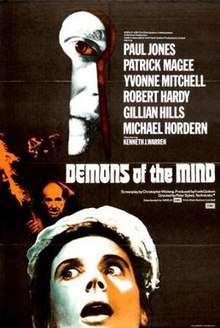Demons of the Mind
Demons of the Mind is a 1972 British horror film, directed by Peter Sykes and produced Anglo-EMI, Frank Godwin Productions and Hammer Film Productions. It was written by Christopher Wicking, based on a story by Frank Godwin. It was released on 5 November 1972.[2] The cast includes Gillian Hills (playing a role originally intended for Marianne Faithfull), Robert Hardy, Patrick Magee, Michael Hordern and Shane Briant.
| Demons of the Mind | |
|---|---|
 Theatrical release poster | |
| Directed by | Peter Sykes |
| Produced by | Michael Carreras Frank Godwin |
| Written by | Christopher Wicking |
| Story by | Frank Godwin |
| Starring | Gillian Hills Robert Hardy Patrick Magee Michael Hordern Shane Briant |
| Music by | Harry Robinson |
| Cinematography | Arthur Grant |
| Edited by | Chris Barnes |
Production company | |
| Distributed by | Anglo-EMI Film Distributors MGM-EMI |
Release date | 5 November 1972 |
Running time | 89 min. |
| Country | United Kingdom |
| Language | English |
| Budget | £250,000[1] |
Plot
A widower locks up his two children, afraid that they will go mad, as did his wife. He then invites a doctor of dubious reputation to supervise the young people's mental health. Meanwhile, in the vicinity of the house, grisly murders are happening.
Cast
- Robert Hardy as Zorn
- Shane Briant as Emil
- Gillian Hills as Elizabeth
- Yvonne Mitchell as Hilda
- Paul Jones as Carl Richter
- Patrick Magee as Falkenberg
- Kenneth J. Warren as Klaus
- Michael Hordern as Priest
- Robert Brown as Fischinger
- Virginia Wetherell as Inge
- Deirdre Costello as Magda
- Barry Stanton as Ernst
- Sidonie Bond as Zorn's Wife
- Thomas Heathcote as Coachman
- Sheila Raynor as Old crone
Background
The film's working title was Blood Will Have Blood.[2]
"Hammer thought there were too many bloods," said Wicking later. "I don't think anybody knew it was a quote from Shakespeare because they would have said no to that."[3]
Principal photography took place from 16 August to September 1971.[2]
Peter Sykes was hired after Hammer were impressed by his work on Venom. The movie was based on the life of Franz Mesmer.[1]
Wicking says "there was a sort of snobbery about" the film "which I think is a bad thing."[3] He says Sykes wanted Paul Scofield and then Dirk Bogarde and when neither of them wanted to do it Hammer felt they could not ask their usual leading men, Peter Cushing and Christopher Lee, and went to Robert Hardy, which Wicking thought was a mistake.[3]
Critical reception
Time Out called the film "an exotic, Wildean horror story, visually as extravagant and tantalising as a decadent painting" that is "badly let down, though, by some grotesque overacting".[4] The Hammer Story: The Authorised History of Hammer Films wrote of the film: "oblique, ambitious and suffused with an air of primal dread, Demons of the Mind deserved better."[2]
References
- Gilbert, Basil (July 1977). "Peter Sykes". Cinema Papers. p. 36.
- Hearn & Barnes 2007, p. 155.
- All's Well That Ends: an interview with Chris Wicking Monthly Film Bulletin; London Vol. 55, Iss. 658, (Nov 1, 1988): 322.
- Milne, Tom, ed. (1991). The Time Out Film Guide (Second ed.). Penguin Books. p. 167.
Sources
- Hearn, Marcus; Barnes, Alan (September 2007). "Demons of the Mind". The Hammer Story: The Authorised History of Hammer Films (Limited ed.). Titan Books. ISBN 1 84576 185 5.CS1 maint: ref=harv (link)